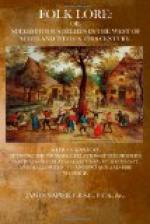If a dying person struggled hard and long, it was believed that the spirit was kept from departing by some magic spell. It was therefore customary, under these circumstances, for the attendants to open every lock in the house, that the spell might be broken, and the spirit let loose. J. Train refers to this superstition in his Mountain Muse, published 1814:—
“The chest unlocks to ward
the power,
Of spells in Mungo’s
evil hour.”
After death there came a new class of superstitious fears and practices. The clock was stopped, the looking-glass was covered with a cloth, and all domestic animals were removed from the house until after the funeral. These things were done, however, by many from old custom, and without their knowing the reason why such things were done. Originally the reason for the exclusion of dogs and cats arose from the belief that, if either of these animals should chance to leap over the corpse, and be afterwards permitted to live, the devil would gain power over the dead person.
When the corpse was laid out, a plate of salt was placed upon the breast, ostensibly to prevent the body swelling. Many did so in this belief, but its original purpose was to act as a charm against the devil to prevent him from disturbing the body. In some localities the plate of salt was supplemented with another filled with earth. A symbolical meaning was given for this; that the earth represented the corporeal body, the earthly house,—the salt the heavenly state of the soul. But there




